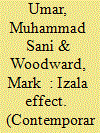|
|
|
Sort Order |
|
|
|
Items / Page
|
|
|
|
|
|
|
| Srl | Item |
| 1 |
ID:
171857


|
|
|
|
|
| Summary/Abstract |
The domain of religion is thought to be rapidly losing significance in the age of secularization. But in contemporaneity, pertinent is the fact that religion has not been wiped away completely or even become any less significant. The religious laws are constantly under process of revision to be in consonant to social and political change. The case of Salman Rushdie in this regard is very well known. He was accused of blasphemy and a fatwa of death was pronounced against him from Iran. This article attempts to evaluate the reasons as to why this fatwa which is just a legal opinion became so important and generated reactions from every part of the world irrespective of sectarian divides in Islam. It also analyses the opinions of the two Islamic schools of thought in the Indian subcontinent – Deoband and Barelvi on the issue of blasphemy and the negotiations they make within their legal discourses to arrive at conclusions with regard the conflictual Islamic and secular laws. Despite emanating from the same Islamic school of jurisprudence – Hanafi but still varying in important aspects of religion, they adopt divergence with regard to the issue of blasphemy.
|
|
|
|
|
|
|
|
|
|
|
|
|
|
|
|
| 2 |
ID:
171858


|
|
|
|
|
| Summary/Abstract |
Stories about women activism in the Tarbiyah movement in Indonesia has gained scholarly attention. The existing literatures, however, tend to focus on the official discourses. This article discusses female members’ everyday experiences within the the liqo activity, as part of the Tarbiyah movement (circle of religious teaching). It examines the extent to which liqo members experience, receive, and practice the da’wa ideology designed by the Tarbiyah movement. It focuses on cadres’ stories about the lived experiences they have had through joining the liqo, with special reference to the female liqo group in Jakarta. Using ethnographic approach, data were collected through in-depth interviews with 26 female liqo members from a total of 45 interviewees and 15 observations of the liqo sessions. The study concludes that although the official form of religiosity, piety and political identity have been promoted by the Tarbiyah movement and its leaders, the experiences and practices of women revealed a heterogeneity and complexity of meanings of being in the liqo. This study attempts to contribute to the existing analysis of the da’wa (Islamic preaching and mission) and politics of a contemporary female Islamist movement with a case study of the Indonesian Tarbiyah movement.
|
|
|
|
|
|
|
|
|
|
|
|
|
|
|
|
| 3 |
ID:
171859


|
|
|
|
|
| Summary/Abstract |
Salafism is a revivalist current in Sunni Islam rooted in the teachings of the fourteenth century Hanbalite jurist Taqi ad-Din Ahmad ibn Taymiyyah and the eighteenth century Arabian reformer Muhammad ibn ʿAbd al-Wahhab. Salafis condemn Sufism (Islamic Mysticism) and most forms of popular Muslim piety, including music, as shirk (polytheism) and unbelief. The Wahhabi variant of Salafism is the only form of Islam permissible in Saudi Arabia and the ideology underlying ISIS and other violent extremist movements. This essay shows that despite the expenditure of vast sums by the Saudi and Kuwaiti governments and NGOs efforts to promote Salafi teachings and armed struggles by ISIS and others to impose them, Salafism has a very limited popular appeal. It is based on textual, ethnographic and survey data from two of the most populous Muslim countries, Indonesia and Nigeria. It also shows that efforts to promote Salafism have led to a resurgence of traditional Sufi oriented piety, especially devotional music traditions.
|
|
|
|
|
|
|
|
|
|
|
|
|
|
|
|
| 4 |
ID:
171860


|
|
|
|
|
| Summary/Abstract |
This study investigates the background of the pioneers of Bank Islam Malaysia Berhad (BIMB) and their perception of Islamic banking to explore the influence that their background had on the practices of BIMB, which have been criticized for being too similar to those of conventional banking. Accordingly, this study opts to explore this topic using interviews with the pioneers, complemented by archival research. Results of the research into the pioneers’ background and their perception of Islamic banking show that most came from a conventional banking background as part of the strong network of the founder of the bank, Abdul Halim Ismail. Furthermore, to fulfill the government’s expectations, they intended to make conventional banking Islamically acceptable rather than simply implementing the profit-and-loss sharing envisaged as ideal by Islamic economists, so they could provide modern banking facilities to economically underrepresented Malay Muslims. The findings reaffirm the significance of the intermediary role of practitioners, their background and philosophy in the development of products and services. In addition, the findings suggest the need for a reevaluation of the research of social scientists exploring whether Islamic banking offers an alternative to conventional global banking, as the pioneers of BIMB did not deny the value of conventional banking, but rather sought to learn from conventional banking to provide competitive banking products in a workable Islamic way.
|
|
|
|
|
|
|
|
|
|
|
|
|
|
|
|
|
|
|
|
|